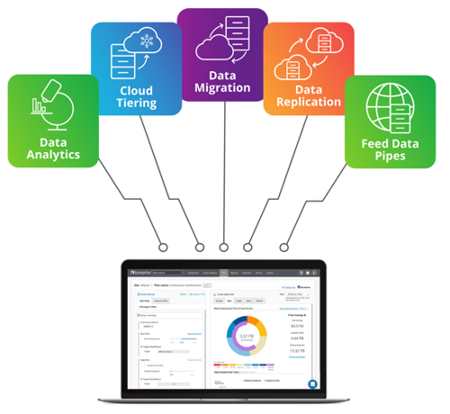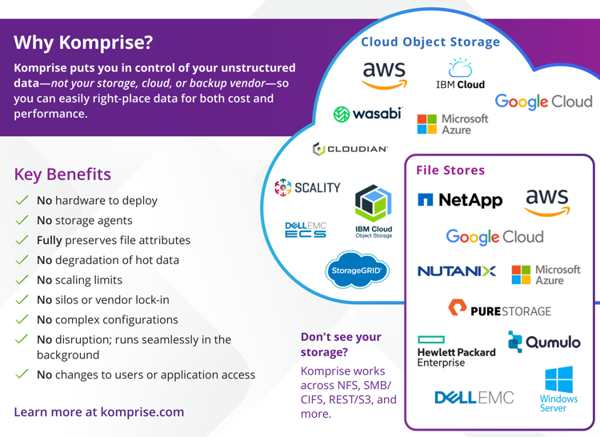Komprise Gives Users Across Enterprise New Tools for Managing Unstructured Data
Self-service features allow line-of-business data owners and data specialists to view data usage, run queries and more, fostering collaboration with IT.
This is a Press Release edited by StorageNewsletter.com on October 5, 2022 at 2:01 pmKomprise, Inc. announced the Fall 2022 release of its Intelligent Data Management, which introduces self-service features for line of business (LOB) IT, analytics and research teams.
Now, central IT can authorize departmental end users to interactively monitor usage metrics, data trends, tag and search data and identify datasets for analytics, tiering and deletion. These capabilities bridge the longstanding gap between IT’s focus on optimizing storage infrastructure and costs and users’ focus on finding and operating on the right data sets.
The Fall 2022 release builds upon Smart Data Workflows, a capability which allows IT teams to automate the process of tagging and discovering relevant file and object data across hybrid data storage silos and feeding the right data to cloud services.
The Deep Analytics user profile give authorized users read-only access to view their own data characteristics such as number, type and age of files and collaborate with IT on data management, delivering compliance and storage savings benefits while giving data owners greater control of their data.
“I’ve been looking for years for a way to know where my data is and what type of unstructured data it is, all with the goal of getting it moved to the correct tier of storage,” says Brett Sayles, storage engineer, St. Luke’s Health. “Komprise does this for me and now I’m excited that I can offer a read-only role to end users. I can see how this would be handy for the business analytics crew and even for engineers/analysts during upgrades to see what data is out there and identify old data that could be purged.”
Use Cases Include:
- Showback: Authorized departmental users can monitor and understand their data usage (examples: how many and what type of files, where stored and biggest consumers) in an interactive dashboard and create queries to get real-time visibility and manage costs, rather than ask IT to create static reports. For example: A new research initiative at a life-sciences organization requires 100TB of storage and the project lead needs to work with IT to move older file shares to cloud storage and free up space.
- User-driven tagging: Users can enrich data with additional metadata tags to facilitate easier search and data management actions such as archival storage or compliance and legal hold. For example: the HR director needs to ensure that all files with employee PII data are tagged so that information is properly and securely stored for privacy requirements and searchable for deletion when the employee leaves. Read this post on a sample data workflow for handling PII using Komprise and Amazon Macie.
- User-driven tiering and data mobility: Authorized users can identify data sets with certain characteristics (such as project or age) to move to cloud storage or other secondary storage for more cost-effective data management or research initiatives. For example: All files related to a project need to be copied to the cloud for data analytics. The entire workflow between users and IT is automated via Komprise.
- Data deletion: IT can set up data movement and deletion as a workflow in Komprise and the entire process is automated without requiring user or IT intervention. For example: All marketing campaign files should be moved to archival storage 30 days after project completion and then confined for deletion after 2 years. The entire data workflow can be based on user queries and policies created by IT.
“User self-service is a growing trend to offload administrative tasks from central IT and give end users the ability to get the data and functionality they need faster,” said Todd Dorsey, storage analyst, DCIG. “By putting more control in the hands of departmental teams and data owners, Komprise is helping increase value from unstructured data in the enterprise.”
“In most organizations, IT is becoming a shared service to its business units and building trust is paramount to its success, especially in the cloud,” says Kumar K. Goswami, CEO, Komprise. “Komprise now allows IT to build trust and drive data-driven decision making in lock-step with their business users.”
Intelligent Data Management Platform updates
Other firm’s Fall 2022 updates include improved SMB protocol for data migration performance and share management, bulk data recall performance improvements, native support for Amazon FSx for NetApp ONTAP, plug-and-play integration with AWS Snowball to automatically migrate petabytes of data to the cloud and enhanced data indexing to support faster data and file search with Deep Analytics.
Resources:
Komprise Intelligent Data Management overview
Blog: Komprise Intelligent Data Management What’s New
Blog: How Storage Teams Use Komprise Deep Analytics
















 Subscribe to our free daily newsletter
Subscribe to our free daily newsletter

